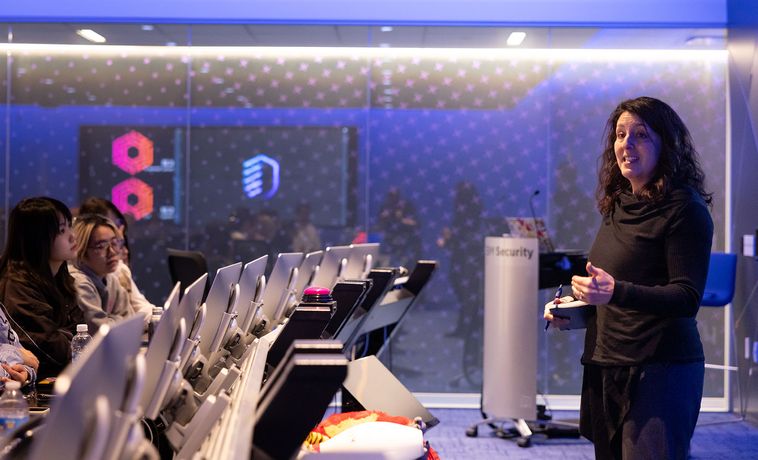The People Person
Human resources executive Colleen McCreary used her public relations training to help Credit Karma through the pandemic

Colleen McCreary (COM’95), Human Resources executive, Chief People Officer, at Credit Karma. Photo by Gabriela Hasbun.
Midway through the final season of the HBO comedy Silicon Valley, tensions mount between management and human resources. The show, which depicts the successes and stumbles of fictional start-up Pied Piper, takes the workplace humor of The Office and Office Space and drops it in California’s ultracompetitive tech hub. When Tracy, the HR director, tells managers Guilfoyle and Monica that their interpersonal skills score poorly in her performance-rating algorithm, they race to befriend their employees and skew the data—or crash the system.
It’s an absurd scene that plays off familiar workplace anxieties. “That’s good comedy—it’s the real world stretched a little bit so you don’t think it’s real,” says Colleen McCreary, the chief people, places and publicity officer at personal finance company Credit Karma. “The reality is, all those stories [on the show] are legit.”
She should know: McCreary (’95) is Tracy. Or, rather, Tracy is based on McCreary, who consulted with writers and producers for the show’s sixth season. As technical advisor, she drew on 20-plus years of HR and start-up expertise to help them add a sheen of authenticity to their storylines—and punchlines.
McCreary has worked for a software giant (Microsoft) and an online gaming start-up (Zynga); she has helped new companies expand and established companies merge. In that time, she’s gained an appreciation for the ways that human resources can help each of a company’s elements operate harmoniously—and, increasingly, how a link between internal and external communications helps that happen. In February 2020, when she assumed responsibility for the company’s PR and social media—just as COVID-19 began to spread in the US and Credit Karma prepared to announce its acquisition by Intuit—she was prepared to help the company weather an unprecedented confluence of events.
The Ins and Outs of Corporate Communication
When McCreary joined Credit Karma in 2018 as the company’s chief people officer, her first challenges were familiar ones to someone with tech industry HR experience: helping guide the company’s growth—they now have 1,300 employees in three countries—and overhauling compensation to remove inconsistencies and bias.
Since 2020, though, McCreary’s primary challenge has become communication: specifically, keeping all those employees—many concerned for their jobs and their health—informed of fast-changing events. Plus, McCreary says, the employee experience is increasingly a media story—a trend accelerated by the pandemic, with attention focused on how companies have adapted. Think of stories about successful pivots to remote work or, at the opposite extreme, of COVID outbreaks at crowded meatpacking plants. The workers, not the products, became the focus.
“Your internal narrative really has to match your external narrative,” she says. “If you don’t do that well, you’re going to have a lot of issues with your employees.” For Credit Karma, founded by CEO Kenneth Lin (CAS’98) with the mission of helping millions of people with free financial services, that means making sure that corporate ideal of building equality reflects inward as well. To ensure that was happening, McCreary, who studied PR at COM, doubled down on her communication background early in the pandemic. “COM does a great job teaching writing and communication skills that you’re going to use for the rest of your life, no matter what path you end up tripping down,” she says.
McCreary began writing a company-wide email every Sunday to check in and provide staff with some certainty during an unusually ambiguous time. That message remains a weekly routine and has evolved into her channel for providing transparency through a series of challenging management decisions, including potential layoffs, the sale to Intuit and vaccine mandates.
COM does a great job teaching writing and communication skills that you’re going to use for the rest of your life, no matter what path you end up tripping down.
Colleen McCreary
When revenues from lenders and other credit companies were cut in half early in the pandemic, areas like recruiting were paused, leaving many employees without work to do. McCreary helped keep everyone busy by moving people around, trying to capitalize on interests and skills while waiting for the global economy to begin churning again. “I needed to give people something to do,” she says. “Contrary to a lot of discussions around unemployment, people like working—they need work and structure.”
McCreary helped Credit Karma launch a series of new projects. One, a COVID recovery road map, drew on Credit Karma’s financial expertise and directed members to stimulus programs, credit-deferral options and other personal economic resources needed to weather the pandemic. A voting road map encouraged civic engagement and attempted to cut through misinformation and make voter registration easier.
Paths Not Followed
When McCreary arrived at BU, she was certain she knew her career goal: politics. “I was going to work on campaigns and I was going to change the world,” she says. An internship on Senator Ted Kennedy’s (D-Mass.) (Hon.’70) 1994 campaign was the perfect opportunity. And McCreary hated it.
“I got to do a lot of really cool things, but it was miserable. People were unhappy,” she says. “All anybody could think about was, ‘What’s the next job?’” So McCreary tried other internships, one with a political consultant, another in a PR agency. She also joined student government, gave campus tours and worked as a resident assistant. And she realized that she liked helping people on a more micro level. “I loved connecting with people and helping them make their decisions,” she says. After graduation, she headed to Columbia University for a master’s in higher education and researched graduate school retention of women in engineering and computer science programs for her thesis. A friend noticed her research and said, “You’re good with technology people,” and encouraged McCreary to pursue a corporate rather than academic career. “The next thing you know, I had a job at Microsoft doing college recruiting—that was the beginning.”
From there, she continued with college recruiting at video game publisher Electronic Arts until she was promoted to director of corporate human resources and diversity. Then she joined Zynga as its chief people officer and helped it grow from 130 to 4,000 employees. Her Silicon Valley career path was set. “I fell in love with not just the products we were making but how they were being made and who was making them,” she says.
Silicon Valley is a long way from the Washington, D.C., life that McCreary once envisioned. She’s grateful for the internships that helped her decide which career to pursue—and which to avoid—and realizes how lucky she was to find paid positions. So, when she established the McCreary Family Fund in 2018, she designed it to help future COM students get those same experiences. That fund, which reached maturity this year, supports students in unpaid internships. “People give to the things that really impacted them,” she says. “If I hadn’t had those internships, I probably would’ve made a lot more career missteps.”
People First
McCreary knows her profession has a sometimes unflattering reputation—due in part to Hollywood depictions like Tracy. “People think the HR lady is either Snow White or Darth Vader,” she says. But her version of the real-life role has a little less dramatic flair. “I am like the product manager of the systems and tools that run the company,” she told First Round Review, an online business-to-business publication, in June 2021.
That might sound like a dry job description, but it’s also hard to imagine a more important role in the two years since the pandemic began. After the financial crunch of early 2020, Credit Karma rebounded. Its acquisition by Intuit was finalized in December and, in early 2021, the company had its most profitable quarter ever. And Comparably, which analyzes company culture and compensation, gave Credit Karma an A+ for its workplace culture after 86 percent of polled employees said they were proud to work there.
To McCreary, keeping the company’s internal and external communications in sync is critical to past and future success because it keeps everyone happy. “It really is about the people—the people you’re going to work with and who you spend your time with,” she says. “It’s why people stay at companies and it certainly is why people end up leaving companies.”



